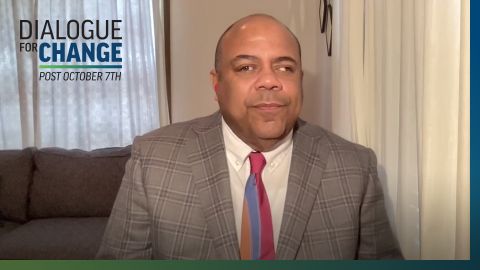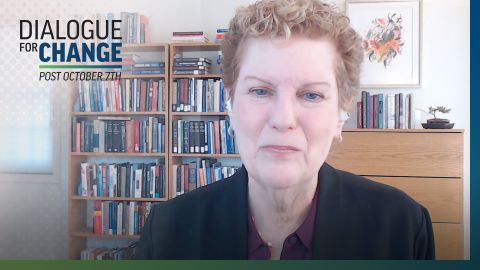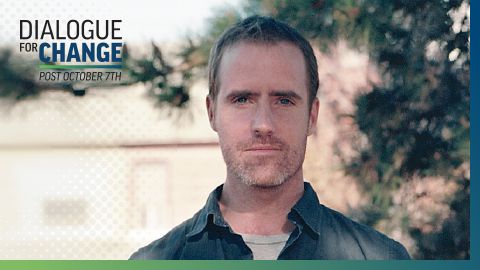JUDY WOODRUFF: The cease-fire in Gaza is holding for now.
But while the confrontation between Israel and the Palestinian group Hamas was taking place,
there were growing reports of anti-Semitic attacks and slurs in several American cities.
William Brangham focuses on the disturbing questions this raises once again
about intolerance and hate in America.
WILLIAM BRANGHAM: Judy, the Anti-Defamation League tracked reports of online comments,
verbal confrontations, and physical assaults in the U.S. during that 11 days of bombing in Gaza
and in Israel, finding -- quote -- "a drastic surge" in anti-Semitic language and attacks.
That included an attack on a 29-year-old man in New York, who was punched, kicked and
pepper-sprayed in Times Square. In Los Angeles, five people suffered minor injuries after they
were attacked by people waving Palestinian flags. In Tucson, Arizona, a synagogue was vandalized.
The ADL also reported thousands of tweets or retweets that seemed to echoed the
phrase "Hitler was right." Last week, five Jewish organizations, including the ADL,
wrote a letter to President Biden about their concerns over this rise in these hateful attacks,
asking him to speak out more forcefully against them.
For more on all of this, we turn to Jonathan Greenblatt, the CEO of the Anti-Defamation League.
Jonathan, great to see you back on the "NewsHour."
In the past, your organization has documented
that, when there is violence between Israelis and Palestinians,
that anti-Semitic attacks in the U.S. go up. Compare now to then. Are we seeing more now?
JONATHAN GREENBLATT, CEO and National Director, Anti-Defamation League: Yes.
It is certainly true that in the past,
conflagrations in the Middle East between Israeli and the Palestinians or its neighbors
have created an -- or catalyzed an uptick in anti-Semitism in America.
But what we are seeing now is more drastic and, frankly, more dangerous. The ADL track
between the two weeks of the conflict and the two weeks before a 63 percent increase.
And that surge is far greater than what we have seen in prior incidents, like 2014, for example.
But what I would also note is not just the quantitative, but the qualitative.
The span of these attacks, they spread like wildfire across the country. You mentioned a few,
California, Arizona, Wisconsin, Illinois, Michigan, New York, New Jersey, South Carolina,
Florida, acts of harassment and vandalism and violence.
So, number one, the span is much greater than what we have seen, but secondly the tone,
the brazenness, the audacity of these assaults in broad daylight. We have seen people basically say,
if you are wearing a Jewish star, you must be a Zionist and you should be killed.
We have seen people hurling bottles and objects at homes with mezuzot on the door that were
identifiably Jewish. We have seen people driving cars or marauding through Jewish neighborhoods
and yelling, "We're going to rape your women," right, or yelling things like "Allahu akbar,"
and literally then wreaking physical violence on people.
And one of the incidents that was captured was in broad daylight in Times Square, a group of people
beating and bloodying a Jewish man whose only crime was he was wearing a kippah,
to the point where he was left unconscious in the street while people kicked him,
bloodied him with like crutches. It was really quite disgusting.
And to think that this is happening in America is really unconscionable.
WILLIAM BRANGHAM: So, what do you attribute this to?
I remember, back during the Trump administration,
you were quick to point out instances where you thought -- political language that fomented
anti-Semitism. Do you do you see political leaders now who are exacerbating this?
JONATHAN GREENBLATT: Well, let's be clear. None
of the people committing these crimes wearing MAGA hats, right?
The reality is, is, I do believe that political language can have real world consequences. But
this is very different kind of political language. So, yes, we called out the prior president and his
kind of acolytes, the extremists from marching in Charlottesville to marauding through Capitol Hill.
But, in this case, we have people waving Palestinian flags and then beating Jewish people.
And, in this case, you know what I might really draw a parallel to
is the hate crimes committed against Asian Americans,
where unhinged, fictionalized conspiracies about China first spouted by political leaders
led to real-world consequences, as Asian Americans were attacked on the streets.
Well, today, we have unhinged, fictionalized conspiracies about Israel, that somehow the Jewish
state is systematically slaughtering children or committing genocide. And then that leads to
real-world attacks on Jewish people in the streets of America, on our campuses, in our communities.
So, although, again, the political tenor may be different, the real outcome is the same.
And that's why we think people, regardless of where you are on the spectrum, need to speak
out clearly and firmly and forcefully and say, in an unambiguous way, that anti-Semitism is
unacceptable, because, again, this isn't activism. It's hate, and it should be called out as such.
WILLIAM BRANGHAM: In that letter that you sent to the White House,
you specifically asked President Joe Biden to speak out more forcefully.
Have you heard from the White House since you sent them that letter?
JONATHAN GREENBLATT: We have been in touch with the White House.
Look, and Joe Biden has been good on these issues his entire career,
from his time in the Senate, to vice president, to now as president. He announced his run for
office decrying the anti-Semitism that he saw in full view at Charlottesville.
So, just this morning, he tweeted out a firm statement we were pleased about.
But we do think it's critical for the administration to stand squarely in solidarity
with the Jewish community in this moment, when so many of us are feeling frightened.
I have heard from Jewish people across the country, and they are feeling scared. They
have extremists on the right. They have these, if you might say, radical voices from the left.
And they are wondering, is it safe for me to go out wearing a kippah?
Is it safe for me to walk to synagogue on a Saturday morning?
Again, this is in America in 2021. So we think the leaders, not just President Biden,
but members of Congress need to speak out and clearly and consistently call it anti-Semitism,
without making equivalence or excuses for any other form of prejudice.
You can have fierce debates about Middle East policy, but that is not an excuse to assault
and victimize Jewish people in America, in Europe, anywhere.
WILLIAM BRANGHAM: All right, Jonathan Greenblatt,
CEO of the Anti-Defamation League, thank you very much for being here.
JONATHAN GREENBLATT: Thanks for having me.



